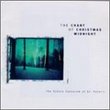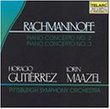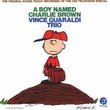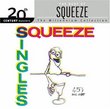| All Artists: Sergey Rachmaninov, Vladimir Ashkenazy, Royal Concertgebouw Orchestra Title: Rachmaninov: Symphonies 1 - 3 Members Wishing: 0 Total Copies: 0 Label: Decca Release Date: 6/10/1997 Genre: Classical Styles: Historical Periods, Modern, 20th, & 21st Century, Symphonies Number of Discs: 2 SwapaCD Credits: 2 UPC: 028944811629 |
Search - Sergey Rachmaninov, Vladimir Ashkenazy, Royal Concertgebouw Orchestra :: Rachmaninov: Symphonies 1 - 3
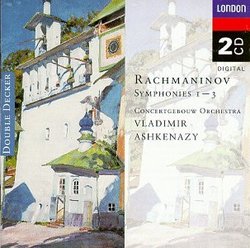 | Sergey Rachmaninov, Vladimir Ashkenazy, Royal Concertgebouw Orchestra Rachmaninov: Symphonies 1 - 3 Genre: Classical
At two discs for the price of one, and three outstanding performances, this set offers great value. Most impressive is the performance of the First Symphony, the disastrous premiere of which precipitated a nervous breakd... more » |
Larger Image |
CD DetailsSynopsis
Amazon.com At two discs for the price of one, and three outstanding performances, this set offers great value. Most impressive is the performance of the First Symphony, the disastrous premiere of which precipitated a nervous breakdown. As a consequence, the work was not revived until after the composer's death. In many ways, it's his most closely argued symphony--each movement begins with the same theme, and they share other melodic material as well. Vladimir Ashkenazy's performance is simply the finest ever committed to disc. He's just about as impressive in the two later works, though there the competition is tougher. The magnificent playing of the Concertgebouw Orchestra certainly adds to this set's attractions. --David Hurwitz Similar CDs
Similarly Requested CDs
|
CD ReviewsA Top Selection for your CD collection 03/10/2001 (5 out of 5 stars) "In my years of buying classical CDs I would consider these two discs to stand among the most truly distinctive and excellent recordings that I have ever owned. I have heard very few recordings of any composer's music that rival this set on combined criteria of recording engineering, artistic interpretation, and sheer listening excitement. In addtion, I would place these recordings among the very finest I have ever heard conducted by Vladimir Ashkenazy and of the London/Decca recording company.The First Symphony, whose traumatic premiere still seems to haunt Rachmaninoff by the very writing of it by 20th century commentators, is thoroughly vindicated in this recording. Ashkenazy manages to produce high drama and a peerless musical response from the Concertgebouw Orchestra. You will find it a superb alternative to other recordings available.The Second Symphony, in which the highest degree of competition exists among other outstanding recordings, Ashkenazy elicits a first-rate recording and interpretation. The first movement allows the listener to hear with great detail the full dimension and scale of the great Concertgebouw Orchestra. The early 1980s recording quality of this--and the other two--symphony are of the highest demonstration quality.The Third Symphony is my favorite. Ashkenazy brings out the Slavic qualities intended by the composer. In the exposition, which is repeated in the first movement--something not found in all recordings, caution--the bells of the orchestra show the Russian Orthodox overtones to this work. The second and third movements are full of emotion and energy. You will find passages that offer sublime drama, a strong understanding of the composer's intentions, and window-rattling sound reproduction. These are beautiful recordings. I offer an unqualified recommendation to anyone interested. And as a two-for-the-price-of-one these recordings are of unparalleled value." A Beautiful Touch with Rachmaninov Jeffery A. Triggs | New Jersey | 02/13/2008 (5 out of 5 stars) "These set the modern standard for the Rachmaninov symphonies. Ashkenazy shows a remarkable affinity for the music. The little known 1st is given a performance that justifies its revival in the repertory. The uncut 2nd is breathtakingly beautiful. Ashkenazy allows it all its "heavenly length" - the complex textures of the first movement, the stunningly energetic scherzo, the beautifully languorous adagio, the delightful cascading "bells" of the last movement. My favorite, however, is the underrated 3rd, for which Ashkenazy displays uncannily "right" tempi throughout. Many conductors luxuriate in the lovely, diving violin solo in the second movement, and no exception here, but how many capture the logic of the final minutes of the symphony? Ashkenazy and the Concertgebouw get it just right - the late, nostalgic revery, and then, quietly at first, the build up to an exhilerating, final frenzy. With other conductors this can seem confused or forced, but here the denouement is perfectly paced and has an inevitable logic that is wonderfully satisfying. Every time I listen to this, I feel a glow of pleasure at having bought these recordings." Top selection Geers | Netherlands | 01/20/2006 (5 out of 5 stars) "All symphonies. As far as I am concerned, particularly symphonie 1 is very allright. The others are good too, but this one number one is really brilliant. Warm music. Picture a group of Chossacs preparing for battle on horse with horns for this music. Absolute. Almost evrything this Ashkenazy does with Rach music is great."
|

 Track Listings (6) - Disc #1
Track Listings (6) - Disc #1![Ghetto Frekka [Vinyl]](/images/no_cover/m.png?v=15401716)
